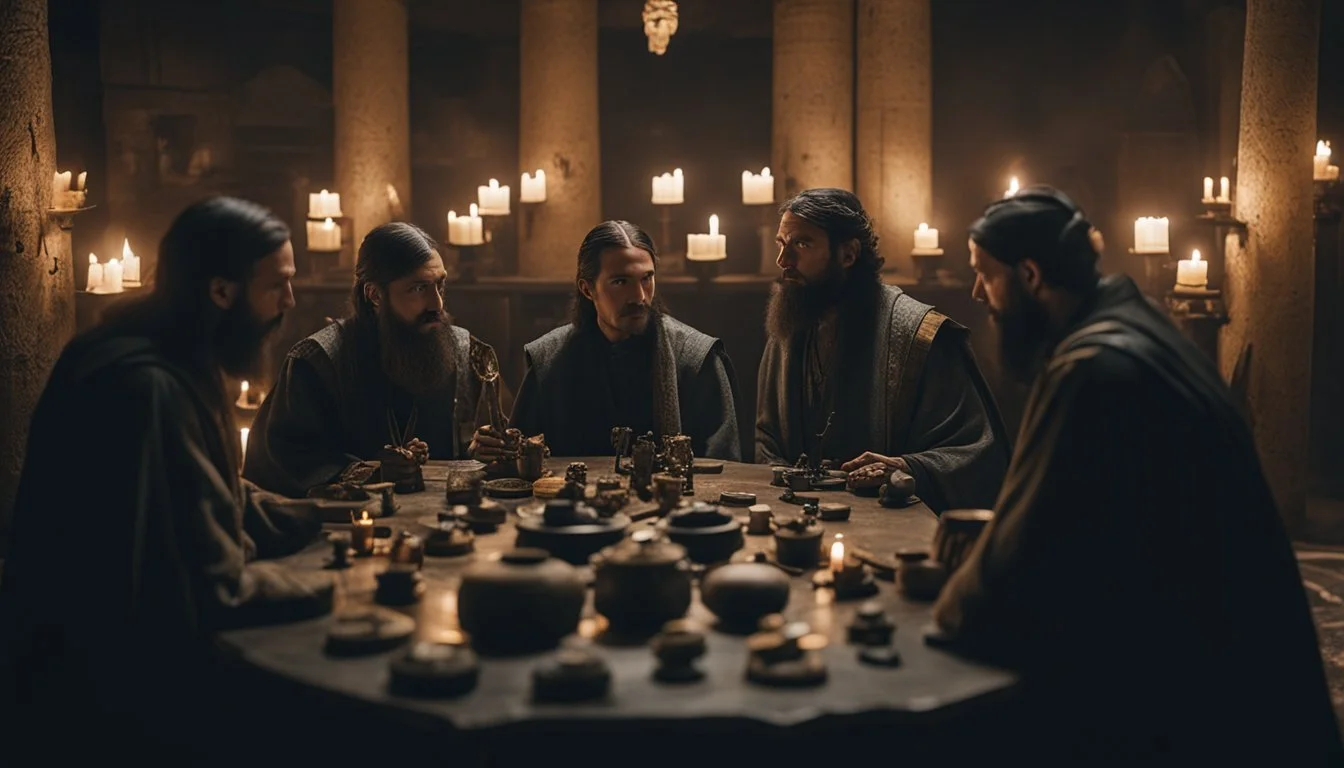6 True Crime Documentaries About Cult Members That Will Shock You
True crime documentaries about cult members offer a fascinating glimpse into the complexities of human psychology and the often dark undercurrents of group dynamics. These films shed light on the allure of charismatic leaders, the emotional and psychological manipulation of members, and the often tragic outcomes of life within cults.
For those intrigued by the enigmatic world of cults and their members, these documentaries provide compelling narratives and thought-provoking insights, allowing viewers to explore how ordinary individuals can become ensnared in extraordinary circumstances. With a mix of historical accounts and personal testimonies, these documentaries reveal the intricate web of devotion, faith, and fear that binds cult communities.
1) Wild Wild Country (2018)
Wild Wild Country is a Netflix documentary series that focuses on the controversial Indian guru Bhagwan Shree Rajneesh, also known as Osho, and his community of followers.
The series details the group's move to Wasco County, Oregon in the 1980s, where they established a commune called Rajneeshpuram.
It provides an in-depth look at the conflict between the Rajneeshees and the local residents. The tension escalates to a series of criminal activities including bioterrorism and attempted murder.
The documentary uses archival footage and interviews with key figures involved in the events. It captures the conflicting perspectives of the Rajneeshees, the residents, and law enforcement.
Wild Wild Country challenges viewers to consider the complexities of religious freedom, community, and power. The series has been described as enthralling, drawing in audiences with its compelling narrative.
For more information, visit Wild Wild Country on Wikipedia.
2) Heaven's Gate: The Cult of Cults (2020)
This documentary miniseries, released on HBO Max in 2020, delves into the story of Heaven's Gate, a religious group led by Marshall Applewhite. This group gained notoriety for its belief in UFOs and a mass suicide in 1997 that claimed 39 lives. This tragedy remains one of the largest group suicides on U.S. soil.
"Heaven's Gate: The Cult of Cults" consists of four episodes and provides a comprehensive look at the group's origins and practices. Through interviews with former members and loved ones, the series offers insights into how the cult operated and its ultimate downfall.
The documentary also explores the personal stories of those who were part of Heaven's Gate, shedding light on their motivations and experiences within the group. It examines the psychological and social factors that contributed to their involvement and eventual participation in the mass suicide.
This series is a detailed examination of one of the most infamous cults in modern history. For further information on "Heaven's Gate: The Cult of Cults," visit its Wikipedia page or IMDb page.
3) The Source Family (2012)
The Source Family, a commune led by Jim Baker, also known as "Father Yod," emerged in Los Angeles in the early 1970s. This cult combined elements of Western spirituality, Eastern mysticism, and rock and roll culture.
The group's lifestyle was unconventional. They practiced communal living, wore unique clothing, and attempted to break away from societal norms. Baker's charismatic leadership played a crucial role in holding the group together.
The documentary offers insight into life within The Source Family. It examines Baker's influence and the group's activities, that ranged from meditation practices to the operation of a popular health food restaurant on Sunset Strip.
It also delves into the dynamics and psychological control within the commune. Former members share their personal stories and reflect on their experiences, shedding light on both the allure and dangers of belonging to such a group.
For more information, visit the IMDB page for The Source Family (2012).
4) Holy Hell (2016)
Holy Hell is a documentary film by Will Allen that recounts his experiences as a member of the Buddhafield cult. He spent 22 years in the cult, during which he served as the group’s videographer.
The film reveals the charismatic yet manipulative leader, Michel, who abused his followers. Holy Hell combines footage Allen shot during his time in the cult with new interviews of former members.
This documentary provides an eye-opening look at how the cult operated and the psychological impact on its members. Through intimate and raw scenes, viewers gain a deeper understanding of the group's dynamics.
For more information on Holy Hell, visit Wikipedia.
5) Children of God: Lost and Found (2007)
"Children of God: Lost and Found" is a documentary directed by Noah Thomson. It delves into the experiences of individuals who grew up in the Children of God cult. The filmmaker, a former member himself, embarks on a personal journey to reconnect with others who have escaped the cult's grip.
The documentary offers a first-person account of what it was like to grow up in such an environment. David Berg, Ricky Rodriguez, Joey Thomson, and Noah Thomson are among those who share their stories. This insight provides a rare glimpse into the controversial practices and the psychological impact on its members.
"Children of God: Lost and Found" shows the difficult transition from cult life to mainstream society. It illustrates the challenges former members face as they attempt to define what "normal" means after enduring years of abuse and neglect.
This film is available for streaming on platforms like Prime Video and Apple TV. Its raw depiction of the struggles faced by former cult members makes it a compelling watch for those interested in true crime and psychological documentaries.
For more information, visit the IMDb page for Children of God: Lost and Found (2007).
6) The Vow (2020)
"The Vow" is a gripping true crime documentary series that delves into the NXIVM cult and its leader, Keith Raniere. Directed by Jehane Noujaim and Karim Amer, the series provides an in-depth look at the organization, which started as a self-help group but later faced allegations of sexual slavery and other crimes.
Premiering on HBO on August 23, 2020, "The Vow" offers a comprehensive examination of the inner workings of NXIVM. The series highlights the experiences of former members who expose the manipulative and abusive practices within the group.
The first season focuses on the personal stories of those who left NXIVM and worked to bring Raniere to justice. The show also explores the psychological control tactics employed by the group's leaders.
The second season, which aired on October 17, 2022, shifts its focus to Nancy Salzman, known as "Prefect" within NXIVM. It delves into her role and influence in the organization, providing further insight into the group's dynamics.
For more information on "The Vow," visit the Wikipedia page.
Overview of Cults
Cults have been part of human history, often characterized by their unconventional beliefs and practices. Understanding the core characteristics and the historical development of cults provides insight into their formation and impact.
Definition and Characteristics
A cult can be defined as a social group with distinctive religious, spiritual, or philosophical beliefs that often deviate from mainstream norms. These groups typically revolve around a charismatic leader who claims to have a special knowledge or divine insight, which attracts followers.
Key characteristics of cults include:
Isolation from mainstream society to maintain control over members.
Mind control techniques such as indoctrination, propaganda, and intense peer pressure.
Intense loyalty and commitment demanded from members.
Us vs. them mentality, often portraying outsiders as threats.
Behavioral and emotional manipulation are frequently employed to maintain control over members, who may be subjected to severe consequences if they dissent or leave the group.
Historical Context
Throughout history, cults have emerged in various cultural and social contexts. In the United States during the 1960s and 1970s, a countercultural movement saw a rise in new religious movements, some of which evolved into notorious cults.
Examples from history include:
The Heaven's Gate cult, which believed in extraterrestrial salvation and ended in mass suicide in 1997.
Charles Manson's Family, responsible for multiple high-profile murders in the late 1960s.
The People's Temple, led by Jim Jones, which culminated in the Jonestown Massacre of 1978.
Cults often capitalize on times of social upheaval or economic instability, promising a sense of community and belonging. Understanding their historical context helps to comprehend the enduring appeal and dangers of these groups.
Psychological Impact on Members
True crime documentaries about cult members often reveal a range of psychological impacts stemming from their experiences. These impacts include the specific methods used for controlling minds and the long-term effects on mental health.
Mind Control Techniques
Cult leaders often employ mind control techniques to manipulate their followers. These methods include isolation from friends and family, sleep deprivation, and emotional manipulation. By creating an environment where uncertainty and fear prevail, cult leaders maintain control over members. Indoctrination sessions and chanting are frequently used to reinforce the group's beliefs. These tactics erode critical thinking, making members more susceptible to suggestion and authority, and can result in a loss of personal identity.
Long-term Effects
The long-term effects of cult involvement can be profound and enduring. Former members often suffer from anxiety, depression, and post-traumatic stress disorder (PTSD). These psychological effects stem from the trauma experienced and the difficulties in adjusting to life outside the cult. Reestablishing relationships and trust can be challenging, as can overcoming the stigma associated with cult membership. Professional therapy and support groups are essential for recovery, helping individuals rebuild their sense of self and regain control over their lives.
Legal and Ethical Considerations
Addressing the legal and ethical dimensions is essential in documentaries about cult members. This covers both the prosecution of cult leaders and the support systems for survivors.
Prosecution of Cult Leaders
Cult leaders often face legal challenges for crimes such as fraud, abuse, and unlawful imprisonment. They are prosecuted under existing criminal laws and specific legislation aimed at coercive control. Evidence collection is a major hurdle, with testimonies from former members being critical. Cult leaders frequently use their power to obstruct justice and manipulate evidence. Legal cases can span years due to the complexities involved.
Support for Survivors
Survivors of cults require extensive support, both legal and psychological. Legal support includes assistance with restraining orders and protection from ongoing harassment by cult members. Psychological support is equally important, as survivors often suffer from PTSD and other mental health issues. Support networks and therapy are vital for helping them rebuild their lives. These survivors also might need financial aid to recover from the economic control exerted by cult leaders.






